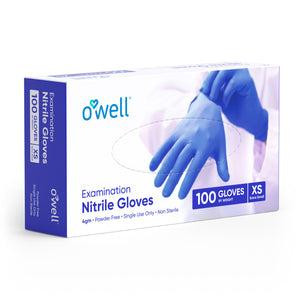In the realm of healthcare and medical settings, ensuring the safety and well-being of both patients and healthcare professionals is of utmost importance. One crucial aspect of this safety protocol is the use of appropriate personal protective equipment (PPE), such as medical-grade nitrile gloves. These gloves play a vital role in maintaining hygiene, preventing the spread of infections, and providing a barrier between healthcare workers and potentially harmful substances.
What Are Medical-Grade Nitrile Gloves
Medical-grade nitrile gloves are a type of disposable gloves made from nitrile rubber, a synthetic material that exhibits excellent resistance to a wide range of chemicals, oils, and biological hazards. These gloves are designed to be used in medical settings, including hospitals, clinics, and laboratories, where the risk of exposure to hazardous substances is high.
Benefits of Using Medical-Grade Nitrile Gloves
Barrier Protection: Medical-grade nitrile gloves act as a protective barrier between the wearer's hands and potentially infectious materials. They are highly resistant to punctures and tears, reducing the risk of exposure to pathogens.
Chemical Resistance: Nitrile gloves provide superior resistance to a variety of chemicals, making them suitable for handling medications, disinfectants, and cleaning agents commonly used in healthcare settings.
Allergen-Free: Unlike latex gloves, which can cause allergic reactions in some individuals, nitrile gloves are considered hypoallergenic, reducing the risk of allergic responses among healthcare workers and patients.
Tactile Sensitivity: Medical-grade nitrile gloves offer a good balance between thickness and tactile sensitivity. This allows healthcare professionals to perform delicate tasks, such as administering injections and suturing, with precision.
Durability: Nitrile gloves are durable and long-lasting, ensuring they can withstand the rigors of medical procedures without tearing or breaking.
Protection Against Bloodborne Pathogens: These gloves provide an effective barrier against bloodborne pathogens, which are microorganisms present in blood that can cause serious infections if transmitted.
Preventing Cross-Contamination: Regular use of medical-grade nitrile gloves helps prevent cross-contamination between patients and medical staff. This is crucial for maintaining a sterile environment and reducing the spread of infections.
Applications of Medical-Grade Nitrile Gloves
Surgical Procedures: Surgeons and operating room staff wear medical-grade nitrile gloves during surgical procedures to maintain sterile conditions and prevent contact with bodily fluids.
Examination Rooms: Healthcare providers use nitrile gloves during patient examinations to minimize the risk of transmitting infections through physical contact.
Laboratories: Medical laboratories handle various biological samples and chemicals. Nitrile gloves offer protection against potential hazards while ensuring accurate test results.
Emergency Care: First responders and emergency medical technicians rely on these gloves to provide safe and effective care to patients in emergency situations.
Dental Practices: Dental professionals use medical-grade nitrile gloves to ensure safety during dental procedures and to prevent cross-contamination.
Choosing the Right Gloves
When selecting medical-grade nitrile gloves, several factors should be considered:
Quality Standards: Look for gloves that meet international quality standards, such as those set by the Food and Drug Administration (FDA) and the American Society for Testing and Materials (ASTM).
Size and Fit: Proper sizing ensures comfort and optimal tactile sensitivity. Ill-fitting gloves can compromise the safety and dexterity of healthcare professionals.
Powder-Free Gloves: Powdered gloves, once common, have fallen out of favor due to concerns about allergic reactions and contamination of sterile environments.
Thickness: Choose gloves with an appropriate thickness for the intended tasks. Thicker gloves offer more protection but might reduce tactile sensitivity.
Textured Surface: Gloves with textured surfaces provide a better grip, especially when handling wet or slippery materials.
For More Info:-







Comments